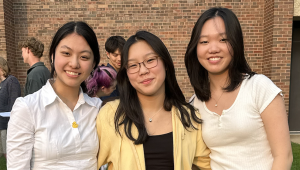Gap year provides unique opportunity
Gap year, though unpopular, proves to be powerful.
May 22, 2017
Despite its seemingly miniscule population, it seems that gap year yields successful students.
Gap Year Coordinator Gretchen Stauder said, “I’ve never heard of a student who has come back and said ‘I wish I hadn’t taken a gap year.’ I’ve definitely heard the opposite, with students coming back and saying they wish they had.”
Senior Spencer Lavin said that though he had been thinking about a gap year for a few months, he was convinced when he “heard back from all my colleges and it didn’t pan out exactly how I thought it would so I figured might as well take a year off, why rush it?”
Lavin plans to spend a few months hiking through the Patagonia mountains in Argentina and Chile, before starting school at a yet-to-be-decided university in 2018.
Though Lavin said he’s excited to travel next year, he has also faced many skeptics.
“Half of the responses I get are ‘wow, that’s really cool’, the other half are kind of like ‘oh, that’s interesting…why not college?’ And they expect that I’m not going to go back to school,” he said.
Despite expectations, when students do return to school, it seems that they often return more confident and ready for independent life.
Senior Lily Thorton said that one of the main attractions for her was the opportunity to adjust to living on her own. “I want to know that I can take care of myself before I also have to deal with schoolwork.”
Thorton said, “I want to be able to do something I wouldn’t get a chance to do without a gap year. After college, people really start their life.”
“From everyone I’ve talked to, you end up going to college with a lot less pressure and a better sense of who you are,” said senior Rachel Skolnik.
Skolnik was inspired to spend next year in Israel after going on a trip to Hungary last summer. When talking to her friends from this trip, Skolnik realized that gap years are “actually pretty common. A lot more kids do gap years at other schools, it’s just not very common at New Trier.”
“Where we live, it’s expected that you go directly to college and get your degree and directly get a job, and I guess that just wasn’t for me. I’ve been doing school for twelve years, I figured it’s time to take a break,” said Lavin.
Many gap year students felt that because the route is so uncommon on the North Shore, the preparation for and discovery of gap year opportunities has mostly been a process conducted independent of the school.
“I didn’t really talk about it with New Trier at all,” said Skolnik. “I just kind of mentioned it to my post-high school counselor after I had already decided.”
Thorton agreed, saying that though the Post-High School Counseling office was encouraging, she was mostly told to do her own independent research.
“They don’t deal with gap years as much, so it’s been kind of a solitary road, trying to figure this out myself, which is part of the fun, I guess,” said Lavin.
One of the most notable resources for potential gap year students is Chicago’s annual Gap Year Fair, which is hosted by New Trier. It welcomes nearly 50 program representatives from all around the world, and allows interested students to ask any questions. This is where Thorton first started thinking about the opportunity.
Stauder encouraged rising seniors not to entirely write off taking a gap year. “There’s plenty of time to decide. Pay attention to it, and explore it,” she said.
“Talk to people that are doing a gap year, even if they’re not doing a program you’re interested in, I think they generally have the same outlook on doing one,” said Skolnik. “Talk about it with the colleges you want to apply to, a lot of them are really open about it, and want you to do one.”
Stauder agreed, saying that “Studies have shown that when [gap year students] matriculate, they have a higher retention rate, and their grades are higher. Colleges look at it favorably.”
She also said this is likely because the students “are ready, and they know what they want. They’re not just blindly following a path, colleges appreciate that they’ve had a chance to get off the treadmill and say ‘this is what I really want.’”











































